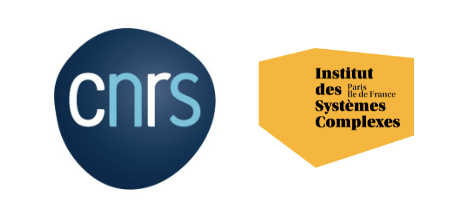Created in 2005, ISC-PIF is a CNRS service and research unit dedicated to the inter-institutional and inter-disciplinary development of research on complex systems. At once a research laboratory, project incubator, shared resource centre, conference centre and academic co-working space, this scientific hub provides researchers with a dynamic research environment and innovative tools based on big data and high-performance computing.
A Scientific Hub
MUTUALISED
Scientists who study complex systems face many theoretical, methodological and technological challenges every day. At ISC-PIF, we believes that these challenges can be tackled through increased collaboration between researchers from different disciplines. This is why we propose the pooling of technical resources and infrastructures on the scale of the scientific community, and encourage the development of free and open software as well as the sharing of data, publications and replicability practices.
INNOVATIVE
Understanding complex systems requires specific resources for their modeling, simulation and mass data analysis. ISC-PIF offers to residents and scientists affiliated to its partners several tools to reduce these technological barriers:
- Infrastructures
- Platforms and software (supercomputing, distributed computing, storage and big data mining)
- High Performance Computing (Grid and Cloud).
INTER-INSTITUTIONAL
ISC-PIF is at the heart of a scientific project recognised by the Île-de-France Region as a Domaine d’Intérêt Majeur (DIM) and supported by the City of Paris.
This CNRS unit (UPS3611) brings together several of the most important institutional partners in France: CEA, EHESS, EPHE, ESPCI, INRAE, INSERM, IGN, Institut Curie, Institut Mines Télécom, MNHN, Université de Cergy-Pontoise, Université de Paris, Université Paris 1 – Panthéon Sorbonne, Sorbonne Université.
Our missions and Services
ISC-PIF’s mission is to develop transversal methods and tools to better understand and master complex systems. The institute coordinates a dynamic, interdisciplinary and inter-institutional research community through three strategic axes:
SPURRING RESEARCH
ISC-PIF offers residencies for scientists and research groups affiliated to our partner institutions who wish to develop their project in a dynamic context. The residents have access to all our services (technological platforms, training, room reservation, communication services) and are fully integrated into the life of the institute: seminars and internal events offer many opportunities to exchange with the members of the institute.
LOWERING TECHNOLOGICAL BARRIERS
To help scientists cope with the skyrocketing masses of available data, our data scientists have developed MULTIVAC, a platform for processing and analysing big data, as well as GARGANTEXT, which offers tools for text-mining, network analysis and interactive visualisation. The OpenMOLE software has been developed by our teams to enable the study, diagnosis and execution of computer models on high-performance distributed computing environments.
REACHING OUT TO A LARGE AUDIENCE
One of our missions is to develop new interfaces between the academic, civic, political and industrial spheres. Throughout the year, we organize events, seminars, workshops and training courses open to the public. The institute is equipped with two co-working rooms, a seminar room and an auditorium. Our residents and members of our partner organisations can organise their own complex systems events on our premises and benefit from logistical and communication support.
Our research areas
ACTIONS IN THE FIELD OF DIGITAL HUMANITIES
ISC-PIF is specialised in the development of tools that allow the analysis of complex systems such as socio-semantic networks and propose new modes of interaction with the scientific and cultural products of societies. These tools are called “social macroscopes”, in reference to the virtual tool described by Joël de Rosnay, which enables the observation of a complex system from an “external” point of view. These macroscopes aim to help citizens, politicians, industrialists and scientists better understand our societies in the same way the microscope or telescope have helped us better understand living things and the Universe.
DATA PROCESSING PLATFORMS
GARGANTEXT
Platform for the exploratory analysis and visualization of large text corpora.
LINKRBRAIN
Platform for multi-scale integration and visualization of human brain data.
MULTIVAC
Big data platform that runs billions of entries (corpora, networks, etc.) and offers tools for visualizing and managing data flows in real time.
OpenMOLE
Open Software that offers tools to explore, diagnose and optimize numerical models, taking advantage of distributed computing environments.




